Moroccan Influence in Dubai: Culture and Real Estate Trends
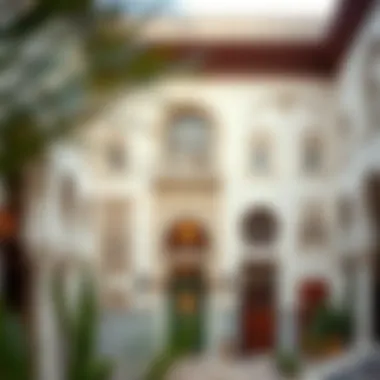
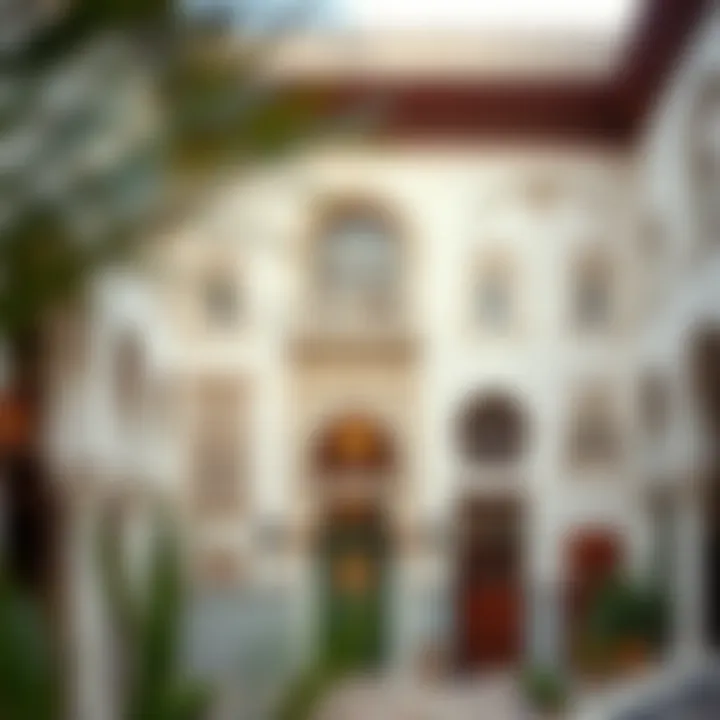
Intro
Morocco and Dubai's relationship has evolved in recent years, driven by a shared passion for commerce, culture, and connection. As Dubai continues to position itself as a global metropolis, the influence of Moroccan culture has started to weave itself into the very fabric of the emirate. This article aims to provide insights into the contemporary manifestation of Moroccan culture in Dubai, highlighting its implications for the real estate market and the lifestyle choices of residents.
In the hustle and bustle of Dubai, Moroccan communities are leaving their mark, from business ventures to architectural influences and mouth-watering cuisine. Investors are increasingly taking note of the intersection between these cultural expressions and real estate opportunities. Understanding this synergy is crucial for potential homeowners, real estate agents, and tenants alike.
As we navigate through various aspects of Moroccan culture in Dubai, including property trends, the culinary scene, and community dynamics, we will unpack emerging market opportunities and practical advice for navigating the property landscape. This exploration reflects the broader implications not only for the residents but also for anyone considering investing in this vibrant city.
With that in mind, let’s delve into the current market insights that underscore the relationship between Morocco and Dubai, focusing on how cultural convergence is shaping the real estate sector.
Market Insights
Current Property Trends
Within Dubai’s dynamic real estate sector, Moroccan influence can be seen notably in areas that house a significant number of Moroccan expatriates, such as Jumeirah and Downtown Dubai. These neighborhoods have seen the rise of Moroccan-inspired architecture, characterized by intricate tile work, ornate stuccos, and grand archways that echo the beauty of Morocco's historical sites. The likeliness of these design elements has not only enhanced the aesthetic appeal but also increased property values.
In 2023, we are observing a significant uptick in properties that sport Moroccan design features, with demand rising especially in luxury apartments and villas. More buyers are looking for homes that resonate with their cultural background, and Moroccan designs have formed an appealing compromise that reflects modern tastes with a touch of tradition.
Investment Opportunities
Investors would do well to have a finger on the pulse of these trends. Properties embedded with Moroccan cultural influences are more than just homes; they represent lifestyle choices that are increasingly in demand. The draw of Dubai's robust economy, coupled with Morocco's rich culture, creates unique investment opportunities.
- High-end Rentals: As more Moroccan professionals find themselves in Dubai, the need for quality housing is growing. High-end apartments and villas become increasingly appealing in well-established neighborhoods.
- Culinary Ventures: Moroccan restaurants are flourishing in Dubai, attracting not just expatriates but also locals eager to explore new flavors. Such businesses can often see rapid growth, creating a ripple effect in real estate.
- Community Spaces: Establishing community hubs that celebrate Moroccan culture can be a lucrative investment. Cafés, art galleries, and cultural centers often act as magnets, enhancing surrounding property values.
"Cultural authenticity can enhance real estate value. Integrating Moroccan design elements and community spaces into developments can attract both local and international investors keen on a distinctive lifestyle."
As we explore the practical aspects of navigating the property landscape in this cultural melting pot, it becomes evident that understanding the nuances of the market can lead to informed decisions for those stepping into the realm of real estate.
Practical Tips
With a clearer picture of the current property trends and investment avenues, let’s shift gears to practical tips for those considering making a move in Dubai's real estate market, particularly in culturally influenced areas.
Understanding the Moroccan Presence in Dubai
The Moroccan presence in Dubai is more than just a passing phase; it's a part of the mosaic that shapes the Emirates' modern identity. The cultural convergence happening on this bustling stage is notable. Not only do Moroccans bring with them a rich history and vibrant traditions, but they also contribute to the ever-evolving landscape of Dubai, particularly in areas like real estate and culinary arts.
Historical Context
Understanding where Moroccan culture fits in the Dubai framework requires a look back. Historically, this connection isn’t born out of randomness. It’s rooted in trade, migration, and the broader Arab world’s shared heritage. From the bustling souks of Marrakech to the luxe developments of Dubai, the historical ties stretch far, fostering an ongoing dialogue between these two regions. For instance, back in the day, the spice trade would see Moroccan merchants, navigating through customs and borders, establishing trade routes that would add to cultural interchanges.
Beyond trade, Moroccan culture has long been integrated into the fabric of Arab identity, enriching local culinary and artistic scenes. Various historical events paved the way for an increased Moroccan presence in the UAE, particularly after the 1970s when economic opportunities led many to relocate to the Gulf. The establishment of social and cultural organizations in Dubai has further bolstered this connection, offering a sense of community and belonging.
Cultural Exchange
Cultural exchange between Morocco and Dubai manifests in myriad ways. The fusion of Moroccan artistry with local traditions brings vibrancy to the cultural scene. For example, you can find traditional Moroccan Argan oil, a treasured commodity, thriving in the markets of Dubai along with the scent of spices that create a warm, inviting atmosphere in restaurants and homes.
Culinary events often highlight Moroccan cuisine, showcasing dishes like tagine and couscous, harmonized with local flavors. Furthermore, art galleries in Dubai increasingly exhibit Moroccan artists, sparking conversations and collaborations that bridge the gap between the two cultures. This exchange provides both communities a chance to learn, celebrate, and innovate.
Also worth noting is the role of festivals. Events that celebrate Moroccan heritage, like the Mawazine Festival, occasionally find a home in Dubai, further intertwining the cultural tapestries.
Demographics of Moroccan Residents
Moroccans residing in Dubai often reflect a diverse demographic spectrum. This group includes professionals from various sectors, particularly in tourism, hospitality, and finance. According to local reports, the Moroccan community has been steadily increasing, particularly among young professionals seeking new opportunities in this vibrant metropolis.
The Moroccan expats often gravitate towards communal living. Areas like Jumeirah and Al Barsha have seen a growing number of Moroccan families choosing to call these neighborhoods home. This choice not only fosters a sense of community but also eases integration into the local lifestyle, with Moroccan schools and cultural centers springing up to cater to families.
"The convergence of Moroccan culture and Dubai is not merely geographical; it's about shared values, dreams, and aspirations!"
This steady influx of Moroccans contributes significantly to the cultural diversity of Dubai, enriching the social fabric and further cementing ties between Morocco and the UAE.
In summation, the Moroccan presence in Dubai is not only significant but also multifaceted, impacting various aspects of daily life, culture, and economic opportunities in the Emirate. This ongoing relationship exemplifies the potential of cultural synergy, paving the way towards a vibrant future.
Influence of Moroccan Culture on Dubai
The Moroccan influence on Dubai encapsulates a vibrant tapestry of heritage, traditions, and modernity. As Dubai positions itself as a global hub, the intertwining of diverse cultures, including Moroccan, enhances the richness of the local environment. This section delves into the multifaceted impact of Moroccan culture on Dubai, specifically honing in on the culinary scene, art and architecture, and the celebrations that bring communities together.
Culinary Scene
Popular Moroccan Dishes
Moroccan cuisine stands out due to its intricate flavors and historical significance. Dishes like tagine and couscous are not just meals but are emblematic of a rich cultural legacy. The use of spices like saffron and cumin not only invigorate taste buds but also mirror the various interactions that Morocco had over centuries. These dishes serve as a bridge between communities, enticing local residents and newcomers alike. Their aromatic appeal and visual vibrancy contribute to a deeper appreciation for Moroccan culture among Dubai's diverse populace.
Restaurants and Cafes
The rise of Moroccan restaurants and cafes in Dubai forms a axis around which many cultural exchanges revolve. Establishments such as Al Jalsa Café offer authentic dishes along with an ambiance steeped in Moroccan decor, like intricate zellij tiles and plush seating. This atmosphere offers patrons an escape into Morocco without the need for a plane ticket. Such places cultivate a social hub where community members gather, share stories, and savor delightful cuisine, accentuating the connections that Moroccan culture fosters in a bustling, cosmopolitan city.
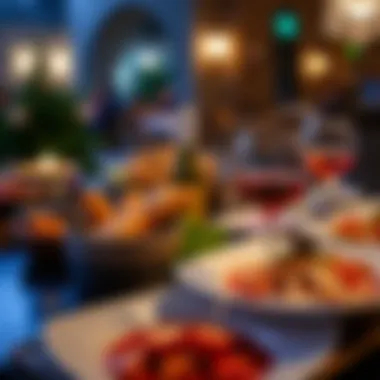
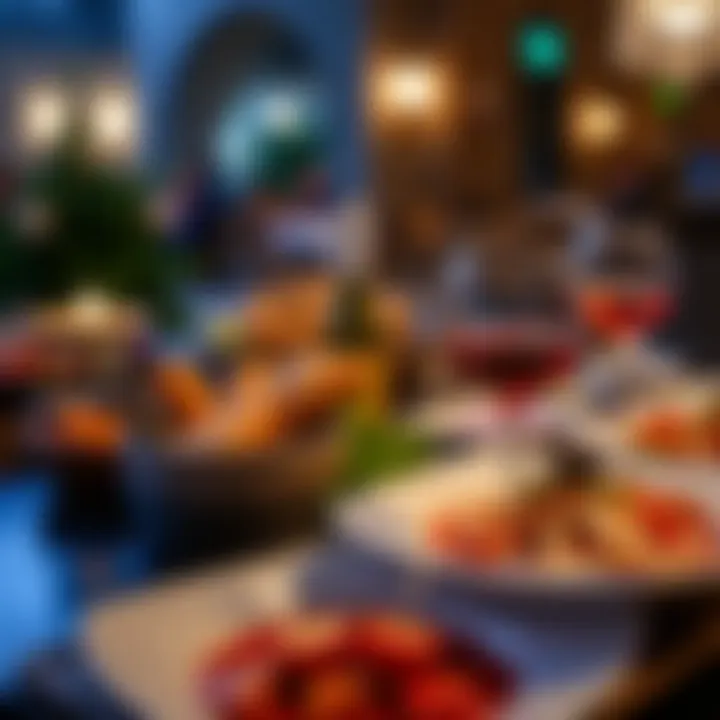
Fusion Cuisine Trends
The culinary landscape in Dubai thrives on fusion cuisine, and Moroccan flavors blend seamlessly with local GCC recipes. Dishes that combine traditional Moroccan stews with a Middle Eastern twist excite the palate, creating something truly unique. For instance, a Moroccan lamb tagine infused with local spices and served with hummus illustrates how culinary traditions can coalesce to enrich the dining experience. This innovative approach not only celebrates Moroccan heritage but also broadens the culinary horizons for residents.
Art and Architecture
Traditional Moroccan Design Elements
Traditional Moroccan design elements, with their bold patterns and intricate craftsmanship, leave a noticeable mark on Dubai’s architecture. The artistry found in twenza (fez caps), woodwork, and mosaic tiles is prevalent in many establishments—bringing a slice of Morocco into the UAE's contemporary aesthetic. Such elements not only beautify spaces but also serve as a narrative of the Moroccan journey. They illuminate how history can influence present-day design philosophies, making them all the more relevant in a city that values both innovation and tradition.
Contemporary Influences
The integration of contemporary Moroccan design into Dubai’s skyline highlights a progressive narrative in architecture. Innovative architects often blend the old with the new, encapsulating the essence of Moroccan architecture while adapting to modern tastes. Buildings characterized by fluid lines decorated with traditional motifs evoke a sense of identity. This creative amalgamation showcases the potential for various cultures to influence one another deeply while making a long-lasting impact on the region's architectural landscape.
Local Art Exhibitions
Local art exhibitions often celebrate Moroccan artists, providing a platform for their artwork that resonates with both originality and cultural significance. Events held at places like the Alserkal Avenue promote creative dialogue while showcasing a range of artistic expressions from Morocco. This inclusivity not only promotes understanding but gives visibility to Moroccan artists, fostering a vibrant community of creatives who draw inspiration from their heritage to share with a diverse audience.
Festivals and Celebrations
Ramadan and Eid
In Dubai, Ramadan and Eid present opportunities for cultural sharing and unity. Moroccan customs, such as traditional pastries like sellou and makroud, often find their way into Emirati homes, illustrating how shared values around family and community transcend borders. These festivities allow Moroccan traditions to illuminate the Dubai cultural landscape, fostering greater acceptance while enriching local celebrations. The significance of these shared experiences marks a special moment where Moroccan culture seamlessly interacts with local traditions.
National Celebration Days
During National Celebration Days, the Moroccan diaspora contributes to the festivities, showcasing their distinct customs through parades and community events. This participation underlines the harmony in diversity, as communities come together to celebrate their heritage within the broader context of the UAE. It turns into a visually rich experience, full of colors and sounds that resonate not just with Moroccans but with everyone present.
Cultural Events and Gatherings
Cultural events throughout the year incorporate Moroccan elements, such as music festivals featuring traditional Moroccan rhythms and contemporary fusion sounds. These gatherings provide a platform for Moroccans and visitors to connect over music, art, and culinary delights. They symbolize a tangible representation of a pluralistic society where each culture adds to the richness of the UAE's fabric. As Moroccans share their customs and practices, it cultivates appreciation and understanding among different communities.
"Cultural exchange is the lifeblood of a truly progressive society, revealing the beauty of collaboration and shared stories."
Real Estate Landscape in Dubai
The real estate landscape in Dubai serves as a pivotal focus in understanding how Moroccan culture intertwines with the city’s growth. Over time, the attraction of Dubai's vibrant economy and strategic location has drawn not just tourists but also a significant Moroccan presence. This section peeks into the current state of the property market, the distinctive elements that Moroccan aesthetic brings to real estate, and the challenges and opportunities that arise within this dynamic environment.
Current Property Market Overview
Market Trends
The property market in Dubai is continually evolving. The latest trends spotlight a surging demand for mixed-use developments. These properties combine residential, commercial, and leisure spaces, catering to a diverse clientele, including Moroccan residents. The design captivates with its beneficial attributes such as convenience and accessibility. Notably, this approach aligns with the Moroccan preference for community-oriented living, reflecting their cultural values.
One intriguing characteristic of the market trends is its responsiveness to international tastes. Investors are increasingly favoring properties that offer a global flair, which Moroccan designs complement beautifully. The unique feature here is the integration of traditional Moroccan styles with modern architecture, creating spaces that resonate with cultural nostalgia while embracing contemporary living. This melding of styles is both a challenge and an advantage in a market that craves uniqueness and allure.
Pricing Dynamics
In recent times, pricing dynamics have come under the microscope. The shifting landscape has shown considerable fluctuations, influenced by supply, demand, and broader economic factors. The stability of property pricing in Dubai often highlights its appeal to investors. Traditionally, Moroccan investors have sought homes in areas that boast a strong community feel, which drives pricing higher in those neighborhoods.
Another aspect worth noting is the affordability in certain districts, where Moroccan buyers can find reasonable options without sacrificing quality. The unique feature of these dynamics is the emergence of off-plan properties. This trend allows buyers to secure lower prices today while awaiting completion, ideal for those looking to invest in community-centric environments.
Investment Potential
Investment potential remains as vibrant as ever. Dubai's real estate market is frequently lauded for its favorable conditions for foreign investors. For Moroccans eyeing investment opportunities, Dubai represents a landscape ripe with promise. The key characteristic is the high yield on rental properties, which features prominently in investor reviews and recommendations.
Moroccans have begun navigating the market not only for residential purposes but also as a means of capital growth. A noteworthy advantage is the replication of Moroccan aesthetics in new developments, appealing to both cultural pride and investment sensibility. However, it’s prudent to consider market saturation in certain areas, as it may pose a risk to returns.
Moroccan Influence on Property Styles
Architectural Trends
As the Moroccan population grows in Dubai, their architectural preferences begin to surface in the local real estate canvas. The hallmark of Moroccan architecture—such as intricate mosaics, vibrant colors, and elegant arches—makes its way into modern design, creating a unique charm that distinguishes properties. This blend enriches the overall ambiance of developments and speaks volumes about the culture’s integration into Dubai.
A defining trait of these trends is that they tell a story, weaving traditional narratives into cutting-edge designs. The benefit of such architectural fusion not only enhances aesthetic appeal but also broadens market reach, attracting both expats and locals intrigued by Moroccan heritage. This characteristic presents an edge in sustainability as well, incorporating environmentally friendly practices into traditional designs.
Interior Design Preferences
When diving into interior design, Moroccans often favor a blend of comfort and extravagance which manifests through vibrant textiles, rich colors, and intricate patterns. This choice resonates well within Dubai’s luxury market, where homebuyers look for spaces that not only impress but also feel like a personal retreat.
The unique feature here aligns beautifully with the growing trend of experiential living; homes that tell a story, sparking conversations among guests. Another advantage is the emotional connection to Moroccan identity, which is strengthened through carefully curated design. The home becomes not just a place to live, but a celebration of culture and identity.
Community Developments
Community developments can be a double-edged sword—on one side, embodying inclusivity and on the other, posing challenges of integration. In Dubai, the emergence of Moroccan enclaves offers a glimpse of how culture influences lifestyle. Properties designed with Moroccan aesthetics not only provide living spaces but foster communal ties, creating social networks among residents.
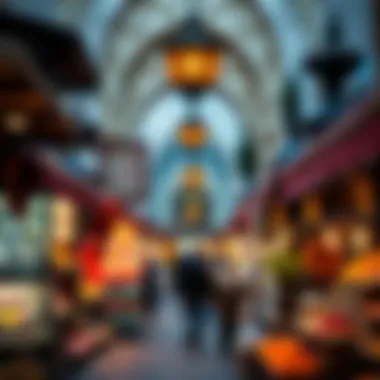
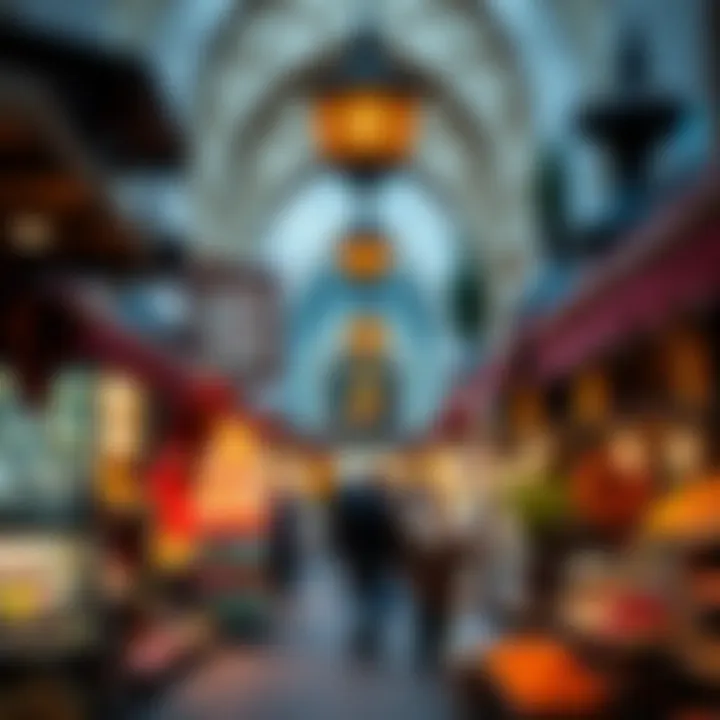
However, maintaining balance within mixed communities can sometimes prove daunting. It’s important for developers to consider the social dynamics and needs of these communities while catering to various cultural backgrounds. Such developments, if executed effectively, can become a beloved spine in the architectural landscape, a testament to Dubai's capacity for harmonious cultural mingling.
Challenges and Opportunities
Regulatory Environment
Navigating the regulatory environment in Dubai can be a complex undertaking. For Moroccan investors, understanding the legal framework governing property transactions is crucial. The strength of Dubai's laws often provides a safety net for foreign investors who might be apprehensive about diving in. Certain regulations encourage foreign ownership, but knowing the nuances can lead to better decision-making.
The key characteristic here is transparency. Dubai often ranks high for property transparency, a significant draw for Moroccan investors. One challenge remains, however: staying updated on any shifts in regulations that may impact ownership rules or tax implications, as such changes can influence investment strategies.
Market Demand Shifts
Shifts in market demand, driven by evolving lifestyle preferences, can reshape property landscapes. Recent trends show a growing interest among Moroccans towards eco-friendly and smart home features. This shift offers new opportunities for investors to diversify portfolios and inject modern principles into their properties.
The unique feature of this demand shift is that it fosters innovation in property development. Developers who adapt quickly to these emerging preferences find themselves at the forefront of market competitiveness. However, there's a risk; not aligning with tenant demands may lead to increased vacancies and decreased property values.
Investment Risks
Though opportunities abound, investment risks loom as well. The real estate landscape can be inherently volatile, with market fluctuations influencing returns. Moroccan investors must stay vigilant about debt levels, pricing shifts, and overall economic health when considering investments in Dubai.
A defining characteristic of these risks is the influence of global markets on local conditions. Externally driven contractions or economic crises can ripple through Dubai, affecting Moroccan investments. The challenge lies in discerning when to invest and how to mitigate those risks, showcasing the need for prudent planning and market insight.
"While Dubai promises remarkable investment potential, understanding the underlying real estate dynamics is essential for informed decision-making."
Lifestyle Considerations for Moroccan Expats
When it comes to finding a new home far from familiar shores, like many Moroccan expats in Dubai, the lifestyle elements they consider are deeply tied to their cultural identity and integration into society. Lifestyle considerations play a critical role in aiding Moroccan expatriates in their transition, helping them to meld their heritage with the vibrant tapestry of life in Dubai. This article zooms in on key aspects that shape the day-to-day living experience of these individuals, offering insight into social networks, housing preferences, and educational choices that resonate with their unique cultural background.
Integration and Community Support
Social Networks
Social networks are essential for Moroccan expats entering Dubai. They provide a bridge into the community, facilitating friendships and connections that may ease feelings of isolation. Joining local groups or online platforms, such as Facebook where expat forums are plentiful, offers a chance for Moroccans to share experiences, recipes, and even advice on settling in. One of the significant characteristics of these social networks is their ability to create a sense of belonging.
a collective of like-minded individuals can be instrumental in creating a support system during tough times and celebrations alike. However, the disadvantage might be that engaging too heavily in Moroccan circles could feel somewhat insular, potentially missing out on wider community interactions.
Local Support Services
The landscape of local support services is fairly rich in Dubai, where Moroccan expats can find help navigating everything from legal paperwork to everyday tasks. Organizations, both governmental and community-led, provide invaluable assistance that eases the transition process. These services mostly focus on practicalities, giving advice on employment rights, housing regulations, and healthcare access.
This accessibility makes it a popular choice for newcomers needing guidance, but one unique aspect of local support services could be tied to varying levels of cultural understanding. For instance, some services might not fully grasp the nuances of Moroccan traditions, which may lead to gaps in support that rest on cultural expectations.
Community Activities
Community activities serve another pivotal function in the lives of Moroccan expats, creating opportunities to engage with others while enjoying cultural elements, like cooking classes or art exhibitions that spotlight Moroccan heritage. These activities not only reinforce the communal spirit but also highlight shared interests beyond just geographic ties.
The diversity of activities available can make these gatherings a beloved choice; however, the challenge lies in coordinating varying schedules and interests of participants, which could dilute attendance or engagement in the long run.
Housing Preferences
Rental vs. Purchase
The decision between renting or purchasing a home in Dubai prompts significant contemplation for Moroccan expats. With a fluctuating market and diverse property options, many might lean toward renting, particularly when they are still acclimatizing to the city's pace and lifestyle. Renting tends to provide the flexibility needed during this adjustment phase while offering insight into potential neighborhoods before making a long-term commitment.
However, purchasing property can be an attractive option, especially considering Dubai's evolving real estate landscape. A unique feature of this choice relates to investment potential; owning property can pave the way for long-term financial stability, a characteristic that draws many investors. On the flip side, it comes with its share of complexities that might discourage renters looking for simplicity.
Preferred Neighborhoods
The choice of neighborhood is emblematic of community ties and cultural fit. Some Moroccan expats favor areas known for their diverse communities, such as Jumeirah or Dubai Marina, where they can find shops and restaurants that cater to Moroccan tastes, ultimately enhancing their lifestyle. Being in proximity to fellow Moroccans can enhance social interactions and decrease feelings of homesickness.
On the downside, popular areas might come with increased living costs, which poses a challenge for those on a budget or those who want to prioritize other aspects of life in Dubai.
Family-friendly Options
Family-friendly housing options weigh heavily on many Moroccan expat decisions. Availability of parks, schools, and community centers can make a neighborhood more desirable. Most expats with kids look for convenient access to schools that align with their educational values and traditions.
This sentiment drives families to favor neighborhoods that offer the right ambiance for raising kids. However, balancing affordability with the required amenities can lead to a juggling act that many families must navigate.
Educational Choices
Schooling for Expats
Education is often at the forefront of decisions made by Moroccan families relocating to Dubai. Expat-friendly schools offer curriculums that are familiar, accommodating various educational backgrounds while celebrating cultural diversity. The opportunity for cultural exchange in classrooms can enrich a child’s experience, providing a fresher outlook on their own heritage.
Nonetheless, the challenge creeps in with varying tuition fees, which can strain budgets, especially if attending top-tier institutions is a priority, placing families in a tough spot regarding cost vs. quality.
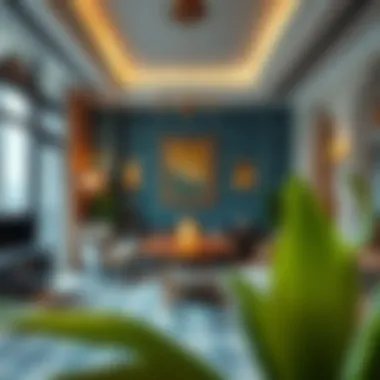
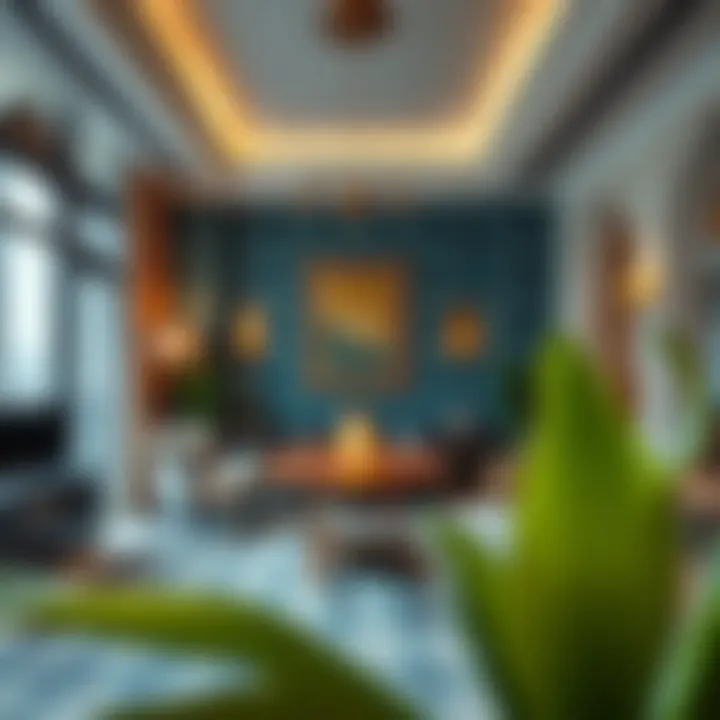
Language Considerations
Language barriers present additional factors to mull over which can affect schooling decisions significantly. While many schools offer bilingual education, families might face challenges if kids struggle with Arabic or English, leading to potential academic obstacles.
On the brighter side, this can also be an opportunity for language immersion, enhancing a child’s adaptability and cultural fluency, a priceless asset in a global city.
Extracurricular Activities
Extracurricular activities bedeck educational choices, enriching a child's social antics and skills outside the traditional learning environment. Moroccan families often look for programs that offer cultural relevance, allowing kids to engage in music, dance, or art rooted in their heritage.
These activities provide vital developmental experiences, contributing to well-rounded individuals. Yet, the challenge of sourcing reliable programs can sometimes become a tedious hunt, with varying quality being noted.
"Integration isn’t just about bricks and mortar; it’s about fostering connections and shared experiences that entwine the Moroccan expat story within Dubai's vibrant culture."
In summary, lifestyle considerations for Moroccan expats in Dubai go beyond mere housing and schooling choices; they encompass a holistic approach to community integration, family dynamics, and the preservation of cultural identity in a foreign land.
Future Outlook: Moroccan Influence in Dubai
The Moroccan culture in Dubai offers a fascinating glimpse into how two vibrant worlds can coexist. The future outlook regarding this cultural influence is critical as it aligns with Dubai's vision of becoming a melting pot of global cultures. Moroccan traditions merge seamlessly with the cosmopolitan lifestyle of Dubai, presenting opportunities for collaboration in various sectors—particularly real estate, which is intrinsically linked to cultural identity.
The intermingling of these cultures creates various benefits, such as enhancing tourism, attracting investments, and promoting diversity. Investors and stakeholders must pay close attention to patterns evolving from this cultural convergence, as it influences lifestyle choices, business opportunities, and community development.
Emerging Trends
Investment in Culture
Investing in Moroccan culture within Dubai goes beyond just monetary concerns. It's about showcasing heritage and traditions that resonate with both residents and visitors. This investment is a key driver in tourism, food arts, and local markets. The appeal of Moroccan-style events and festivals can attract people, creating a unique cultural landscape for both locals and expats. Moreover, investing in cultural projects enhances the social fabric, making a place more attractive to potential homeowners and investors.
Unique aspects of this investment include art exhibitions featuring Moroccan artisans or culinary spots offering traditional dishes. These elements provide economic benefits by generating income through tourism and supporting local businesses. On the flip side, while this fosters growth, it can lead to the commodification of culture, where authenticity may be compromised for profit.
Real Estate Projections
The real estate market in Dubai shows a promising trajectory as Moroccan influence continues to grow. Projections indicate a rise in demand for properties that reflect Moroccan aesthetics, such as riads and villas adorned with traditional tiles and mosaic art.
This trend underscores a new opportunity for developers to cater to niche market preferences, balancing modern amenities with cultural significance. It enhances property desirability and boosts market value long-term. However, investors must be cautious about over-saturation in this segment, which might diminish its appeal and value.
Community Growth
Community growth surrounding Moroccan culture in Dubai points towards a thriving integration. Expanding Moroccan neighborhoods promote a sense of belonging, fostering social bonds among residents. Local businesses flourish as they cater to community needs, from traditional markets to specialty shops.
The vibrant community acts as an incubator for cultural initiatives and events, adding layers to Dubai's social landscape. However, rapid growth can strain resources and infrastructure, necessitating sustainable planning to ensure that the community successfully integrates without losing its character.
Policy Implications
Government Initiatives
Government initiatives play a critical role in nurturing Moroccan influence within Dubai. Policies promoting cultural diversity attract not just Moroccan nationals but also investors keen on tapping into multicultural markets. These initiatives often include support for cultural events, endorsing Moroccan arts, and partnerships with community organizations.
A notable advantage is the increased visibility of Moroccan culture, which can enhance Dubai's reputation as a global city. Yet, should initiatives lack strategic planning, they risk fragmented outcomes that may dilute genuine cultural practices.
Wealth Distribution Considerations
Wealth distribution considerations directly affect Moroccan expatriates and entrepreneurs. The growing economic participation of Moroccans in Dubai can mitigate socio-economic disparities among expatriates. Supporting equitable access to financial resources, particularly for startups or cultural businesses, can empower the community and lower barriers to entry.
This equitability can result in a thriving economy that reflects the richness of various cultures. However, persistent inequalities may still pose challenges that hinder growth and exacerbate tension within communities.
Long-term Planning
Long-term planning is essential to ensure the sustainability of Moroccan influence in Dubai. A proactive approach can help integrate cultural initiatives into the city's urban development strategy. This planning covers everything from aligning real estate projects with cultural needs to regulations that protect cultural heritage.
A unique feature of long-term planning lies in its potential to foster a cohesive community identity. A diverse cultural landscape can significantly enhance the overall quality of life. However, it requires consistent investment and attention; otherwise, the short-term gains may deteriorate into disjointed efforts that fail to maintain the interest of community members.
Investment Opportunities
New Developments
New developments reflecting Moroccan architectural styles can significantly contribute to Dubai's expansion. This includes residential units and commercial spaces that pay homage to Moroccan design, drawing both interest and investment potential.
Incorporating such designs can distinguish properties in the market, making them stand out for buyers looking for unique living experiences. However, developers need to ensure that these design elements resonate with the local market to be financially viable; else, they might attract limited interest.
Commercial Ventures
Commercial ventures focusing on Moroccan goods or services present a solid business opportunity. Markets, restaurants, and museums that celebrate Moroccan culture can enhance Dubai's tourism appeal.
By tapping into this venture, investors can enjoy various returns, from cultural events drawing crowds to enhanced pedestrian traffic boosting local sales. Still, the challenge lies in creating consistency in quality and experience, which is vital for repeat business.
Partnerships and Collaborations
Partnerships and collaborations are critical for amplifying the Moroccan presence in Dubai. Joint ventures between Moroccan and local businesses can pool resources and expertise, elevating their offerings to a broader market.
The synergy fosters innovation and introduces authentic Moroccan culture to a wider audience. However, these partnerships require careful management; misaligned goals can lead to friction, with both parties missing out on the full benefits of collaboration.















